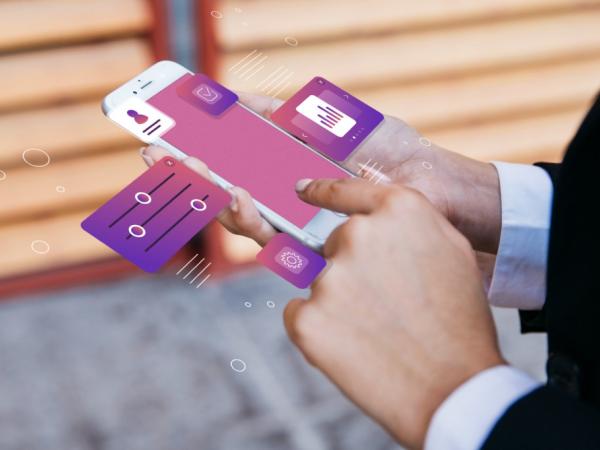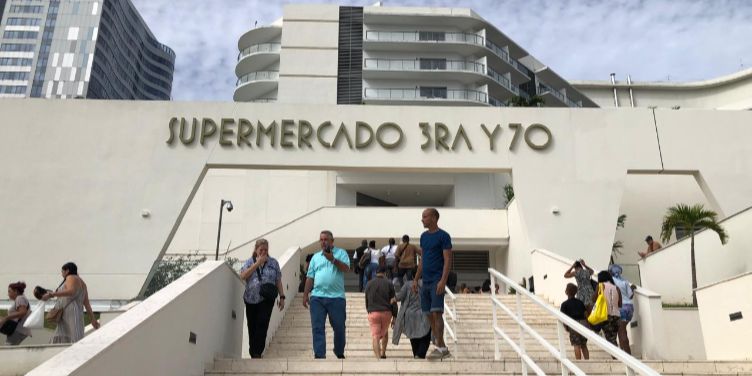Predicting the future is far from being an exact science. But in what corresponds to Colombia You don’t need a working crystal ball to forecast. – with a high degree of certainty – that by the end of the year a new name will be part of the usual lexicon of millions of people and businesses throughout the national territory.
(Read more: Davivienda denies signing an agreement with Scotiabank to buy its operation)
In fact, in a matter of weeks an advertising campaign will appear whose slogan is almost self-explanatory. “In 2025 everything will be more Bre-B,” states the draft of the new piece, which immediately warns those who see it: “send or receive money from bank to bank at any time of the day.”
More than one unsuspecting passerby may think that it is an offer with its own name, until they begin to see that the logos of multiple financial institutions accompany the same message. So, in a matter of months the Bre-B seal will be known as the immediate payment system that will make life easier for many people.
Although expectations will increase, we will have to wait until September for people to experience the benefits of a model that has been a true revolution in different latitudes. Just look at what happened in Brazilwhich in 2020 saw the birth of Pix, which is now used by three quarters of the citizens of the largest nation in Latin America.
(Read more: How much the fine increased for drivers who use mobility applications in 2025)
Due to the massification of the tool, most of Brazilians’ daily operations – from shopping in a market to going to a restaurant or paying for transportation – rely on this instrument. According to statistics from the Central Bank of that country, 5,710 million direct transactions were recorded in December, which is equivalent to a jump of close to 35 percent compared to the records of a year ago.
And this, say those who know, is just beginning. From the users’ point of view, there is a significant saving in the cost of sending or receiving money, to which is added the appearance of countless financial options adapted to the particularities of each individual or business.
For their part, several analyzes maintain that new circumstances drive economic growth and open opportunities –like accessing formal credit– which translate into greater consumption capacity and more business dynamics. Incidentally, the use of cash in the South American giant has been falling rapidly, because it is becoming less and less necessary.
It is totally feasible that something similar could happen in Colombia. Both the omnipresence of mobile telephony and the great popularity of digital wallets – type Nequi, Daviplata, dale!, Lulo or Uala, among others – make the terrain conducive for Bre-B to take off quickly.
Bre-B immediate payment system.
Courtesy
(More news: What is the UPC, and why do they criticize the increase established by Gustavo Petro?)
own merit
No less important is the genesis of this fundamental change whose driving force is the Bank of the Republic. Due to his role as “bank of banks” and a series of rules that allowed it to enter the world of immediate payments, The Issuer undertook the design of the scheme with enthusiasm and professionalism.
Much of the success of the process has been playing with open cards, which includes clear objectives and a permanent dialogue with the different actors, whether public or private. This has made it possible to listen to suggestions, open spaces to collect comments and bring multiple interested parties onto the same boat.
So, The final part of 2022 and all of 2023 were used to advance a series of technical forums on payment systems, which included working groups on complex issues related to technology and interoperability. In parallel, a law authorized the Bank to determine the regulation and it released versions of circulars that initially contained general guidelines, as well as technical annexes that were distributed in 2024.
Having a type of impartial referee who listens and is in charge of establishing the rules of the game, painting the field and providing the equipment, is key so that there are no resentments.
This largely explains the good performance of UPI in India or BI-FAST in Indonesiato just name a couple of exemplary cases apart from the already mentioned Pix.
Put colloquially, no one here is doing business at someone else’s expense. What it is about is building an umbrella that covers under its shadow all the entities that handle public money, as well as the companies and people who wish to shelter themselves, knowing that those who prefer to stay outside will be exposed to the sun and rain.
From the point of view of individuals, what it is about is being able to transfer funds at zero cost. Today this possibility exists for clients of the same financial institution.but not necessarily when the sending involves different banks or digital wallets.
Added to the above is immediacy, at any time, regardless of the day of the year. As explained by Ana María Prieto, director of Payment Systems at Banco de la República, “We will be able to send the money from one account to another and it will be received in 20 seconds”. This implies that the restriction of making an electronic transfer to a third party before 12 noon for it to be effective on the day or the need to wait until Monday if the shipment is made on a Friday afternoon will disappear.
Besides, The Issuer’s economist emphasizes that Bre-B integrates digital wallets and adds dozens more entities such as cooperatives or microfinance institutions. “It doesn’t matter where you have the account to generate a payment,” he emphasizes.
(Read more: CPI: what is it and how is this economic indicator calculated?)

Open Banking
Private file
What’s missing
Told like this, The story seems simple, but it clearly is not. To begin with, there is the technological challenge of building the infrastructure that allows people to connect with others and deliver responses in real time.
Along with the above, the difficulty arises of liquidating each operation so that everyone is credited or debited with their money without unjustified rejections. Altogether, every time there is a cut, banks or intermediaries will have balances in favor or against which must be adequately compensated so that liquidity problems do not appear. Each step demands planning and effective solutions, along with innovative mechanisms.
But beyond the fact that in these months the rigorous tests are carried out and everything works properly, starting in the second semester comes the true test of fire. This consists of the reaction of citizens, who will be invited to choose the personal key that will allow them to open the doors of the system.
The term refers to an identifier for each individual accountwhich can be the cell phone number, email, ID or a password with letters and numbers (alphanumeric). If someone is a client of several entities, they may have different keys, which will be hosted in one place or another.
By September, Colombians who have an account at a financial institution (about 90 percent of adults) will find the Bre-B seal when virtually entering their space. Whoever wants to make a payment will only have to authenticate and proceed to write the recipient’s key (which in the case of a business can be a QR code), which will vacate it in less than a minute. The procedure will always be the same, so that the experience is uniform.
It is worth clarifying that this is an option intended for transactions of a relatively low amount. To date, the calculation is that the limit per transfer will be around 11 million pesos, although each financial intermediary will have independence to establish additional ceilings, whether, related to amount or frequency.
One of the considerations for this to be the case is security. Just as the ability to spend money in the blink of an eye serves to make everyday life easier, friends of others will try to take advantage of that speed to keep what is not theirs.
(Read more: Toll prices: why did they increase more than what was established by the Government?)

Open banking
iStock
Back to Brazil, The launch of Pix was accompanied by a higher rate of express kidnapping reports. In response, different strategies were tested that have led to a lower incidence of this crime and of which Colombia has taken careful note.
However, the risks are smaller than the opportunities that arise. As far as banks are concerned, they will stop receiving income from transfers made by their clients to other entities. Despite this, the terrain that is open to them is enormous, starting with the placement of credits, the offering of investment alternatives or the sale of insurance.
Due to this, when Bre-B debuted During an event organized by the Banco de la República in mid-October last year, the support of the sector executives who were present was enthusiastic. In general, and beyond the operational complexities that adapting to a new scheme brings, the vision regarding what is coming this year is very positive.
Furthermore, there is awareness that there is still a lot of ground to cover. Within the Issuer’s roadmap, the tool is about to be scaled up to cover transfers between companies, the collection of local and national taxes or the payment of mass transportation, among others. Even more ambitious is reaching cross-border payments, which would facilitate tourism and foreign trade.
All of the above is important for competitiveness reasons. Both in Latin America and in the rest of the world there is a real boom in immediate payment systems, which is why it is always better to be among the first in line than among the last.
And it is worth emphasizing that the figures involved are enormous. According to the firm ACI, transactions in this way globally will amount to 575.1 billion dollars in 2028, which would be equivalent to 27 percent of all electronic payments. The same source maintains that, as far as Colombia is concerned, the growth rate of the mechanism would be greater than 40 percent annually in the next three years.
For this to happen, it is key that everything works well from the first moment, since public trust is essential. Both the pedagogy carried out by the Bank of the Republic and other actors are part of an equation in which variables abound. Fortunately, the judicious work that has been done leads us to look at what lies ahead with optimism.
The announced improvement will also be useful to convince Colombians that, In the midst of the difficulties and pressures of everyday life, The country is capable of moving forward. It does not sound far-fetched to say that, at least in this field, before the end of 2025, things will be easier and friendlier for the vast majority. Briefly put, that is what justifies the hope that accompanies the soon arrival of Bre-B.
(See: World food prices fell 2% in 2024, according to the FAO)
RICARDO ÁVILA PINTO
Special for EL TIEMPO
In X: @ravilapinto
















